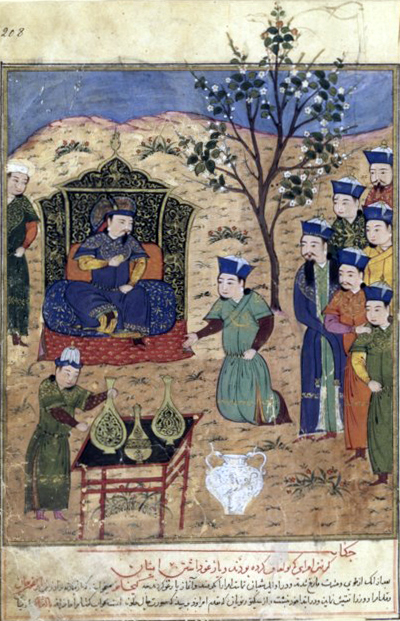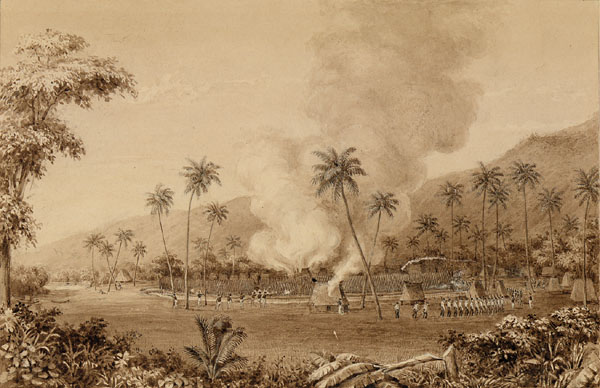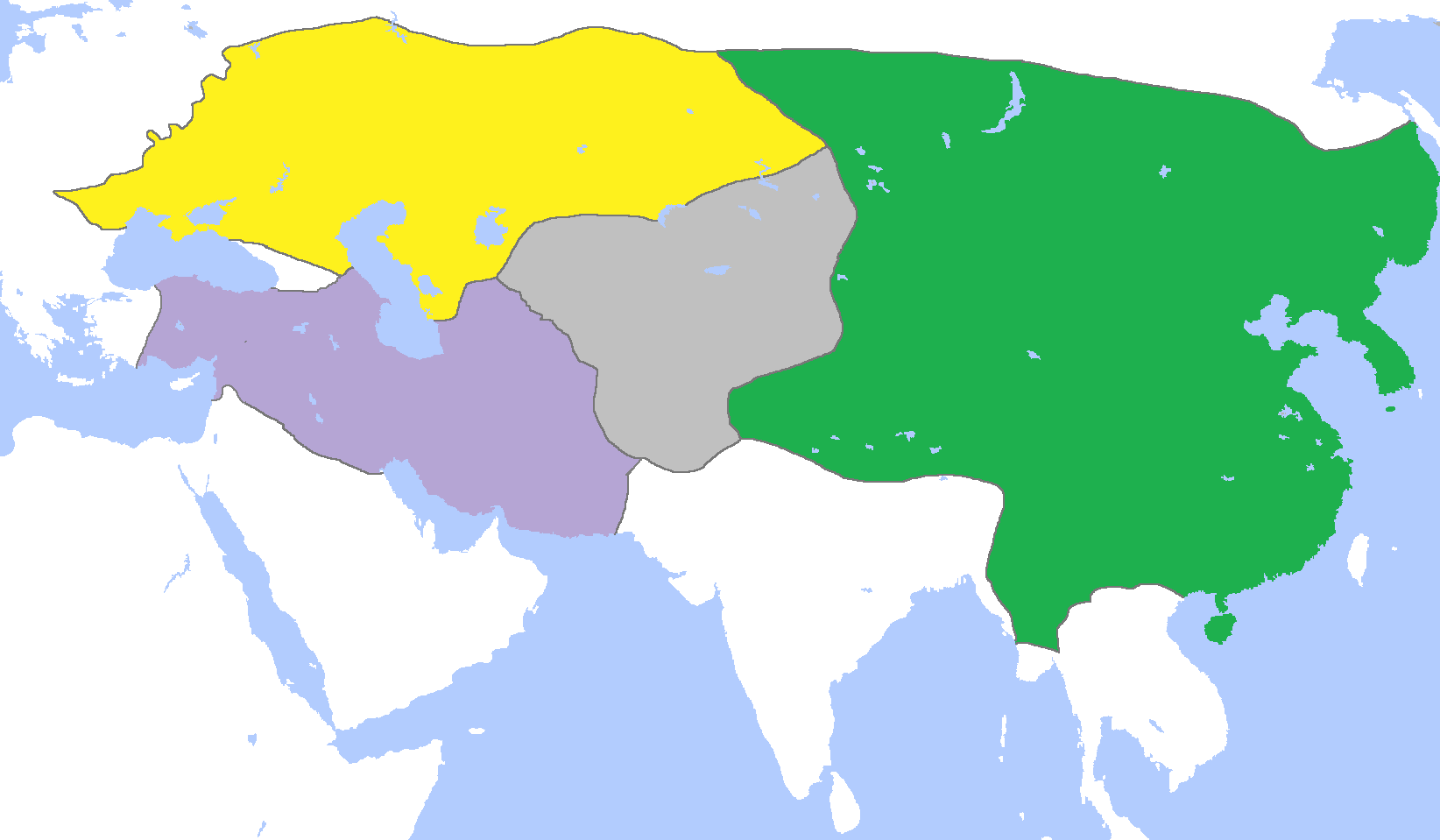|
Qurumushi
Qurumushi or Qurmushi was an Ilkhanate commander of Keraite origin who served as Mongol viceroy of Georgia. Early life He was from Tongqayit clan of Keraite tribe who migrated from Mongolia accompanying Hulagu's army. His grandfather Tügür was Hulagu's scribe, member of keshig and a commander, while his great-grandfather Quyidu served Genghis Khan and Ong Khan. His father Alinaq served Ahmad Tekuder as his commander-in-chief and was as well as his son-in-law. He had two brothers as well. Qurumushi was a member of force tasked by Tekuder with severing the connection between princes Arghun and Qonqurtay in 1284. He served as a messenger to his father on 1 May 1284 when Tekuder asked Alinaq to prepare for fight against pro-Arghun forces. However, they prevailed and Alinaq was executed on 4 July 1284 by Arghun. Under Arghun After his father's execution Qurumushi inherited Alinaq's domains in modern Javakheti, his mingghan and his wife Kuchuk Khatun in levirate. He was tasked b ... [...More Info...] [...Related Items...] OR: [Wikipedia] [Google] [Baidu] |
Arghun
Arghun Khan ( Mongolian Cyrillic: ''Аргун хан''; Traditional Mongolian: ; c. 1258 – 10 March 1291) was the fourth ruler of the Mongol empire's Ilkhanate, from 1284 to 1291. He was the son of Abaqa Khan, and like his father, was a devout Buddhist (although pro-Christian). He was known for sending several embassies to Europe in an unsuccessful attempt to form a Franco–Mongol alliance against the Muslims in the Holy Land. It was also Arghun who requested a new bride from his great-uncle Kublai Khan. The mission to escort the young Kököchin across Asia to Arghun was reportedly taken by Marco Polo. Arghun died before Kököchin arrived, so she instead married Arghun's son, Ghazan. Early life Arghun was born to Abaqa Khan and his Öngüd, possibly Christian concubine Qaitmish egechi in 8 March 1259 (although Rashid al-Din states it was in 1262, which is unlikely) near Baylaqan. He grew up in Khorasan under care of Sartaq Noyan (from Jalair tribe) who was his ... [...More Info...] [...Related Items...] OR: [Wikipedia] [Google] [Baidu] |
Hulagu Khan
Hulagu Khan, also known as Hülegü or Hulegu ( mn, Хүлэгү/ , lit=Surplus, translit=Hu’legu’/Qülegü; chg, ; Arabic: fa, هولاکو خان, ''Holâku Khân;'' ; 8 February 1265), was a Mongol ruler who conquered much of Western Asia. Son of Tolui and the Keraite princess Sorghaghtani Beki, he was a grandson of Genghis Khan and brother of Ariq Böke, Möngke Khan, and Kublai Khan. Hulagu's army greatly expanded the southwestern portion of the Mongol Empire, founding the Ilkhanate of Persia, a precursor to the eventual Safavid dynasty, and then the modern state of Iran. Under Hulagu's leadership, the siege of Baghdad (1258) destroyed Baghdad's standing in the Islamic Golden Age and weakened Damascus, causing a shift of Islamic influence to the Mamluk Sultanate in Cairo and ended the Abbasid Dynasty. Background Hulagu was born to Tolui, one of Genghis Khan's sons, and Sorghaghtani Beki, an influential Keraite princess and a niece of Toghrul in 1217. ... [...More Info...] [...Related Items...] OR: [Wikipedia] [Google] [Baidu] |
Chupan
Amir Chūpān ( fa, امیر چوپان; died November 1327), also spelt Choban or Coban, was a Chupanid noble of the Ilkhanate, and nominal general of the Mongol Empire. He was ennobled by Emperor Taiding of Yuan as Duke of Yi (翊國公). Background Chupan's father Malek participated in Siege of Baghdad while his uncle Akrunchi participated in a campaign in Georgia in 1318. His grandfather was Tudaun from the Suldus clan and was directly descended from Chilaun, who was one of Chingis Khan's four great companions. Tudaun accompanied Hulagu on his campaign against Golden Horde in 1262 and named as governor of Diyar Bakr, died in 1277 at the Battle of Elbistan. Early career He participated in a battle against Nogai of Golden Horde in 1289 during his 20s. Amir Chupan was mentioned as a supporter of Gaykhatu during the latter's successful campaign for the Ilkhanid throne. During Ghazan's fight with Baydu for the throne in 1295, Chupan met with him near the Ustunav ... [...More Info...] [...Related Items...] OR: [Wikipedia] [Google] [Baidu] |
Viceroy
A viceroy () is an official who reigns over a polity in the name of and as the representative of the monarch of the territory. The term derives from the Latin prefix ''vice-'', meaning "in the place of" and the French word ''roy'', meaning "king". He has also been styled the king's lieutenant. A viceroy's territory may be called a viceroyalty, though this term is not always applied. The adjective form is ''viceregal'', less often ''viceroyal''. The term ''vicereine'' is sometimes used to indicate a female viceroy '' suo jure'', although ''viceroy'' can serve as a gender-neutral term. Vicereine is more commonly used to indicate a viceroy's wife. The term has occasionally been applied to the governors-general of the Commonwealth realms, who are ''viceregal'' representatives of the monarch. ''Viceroy'' is a form of royal appointment rather than noble rank. An individual viceroy often also held a noble title, however, such as Bernardo de Gálvez, 1st Viscount of Galveston, who ... [...More Info...] [...Related Items...] OR: [Wikipedia] [Google] [Baidu] |
Gaykhatu
Gaykhatu (Mongolian script:; ) was the fifth Ilkhanate ruler in Iran. He reigned from 1291 to 1295. His Buddhist baghshi gave him the Tibetan name Rinchindorj () which appeared on his paper money. Early life He was born to Abaqa and Nukdan Khatun, a Tatar lady in c.1259. He was living in Jazira during Tekuder's reign and had to flee to Arghun in Khorasan after Qonqurtai's execution in 1284. He was given as hostage to Tekuder by Arghun as a condition of truce in June 1284 and put in orda of Todai Khatun, his step-mother. After Arghun's enthronement, he was confirmed as governor of Anatolia together with his uncle Hulachu. Rule in Anatolia He was stationed in Erzinjan and learnt to speak Persian and to some degree Turkish during his stay in Anatolia. Gaykhatu ruled Anatolia solely after recall of Hulachu to Iran in 1286. It was then he was married to Padishah Khatun, a princess of Qutlugh-Khanids. He aided Masud II on his campaigns against Turkmen principalities, most ... [...More Info...] [...Related Items...] OR: [Wikipedia] [Google] [Baidu] |
Punitive Expedition
A punitive expedition is a military journey undertaken to punish a political entity or any group of people outside the borders of the punishing state or union. It is usually undertaken in response to perceived disobedient or morally wrong behavior by miscreants, as revenge or corrective action, or to apply strong diplomatic pressure without a formal declaration of war (e.g. surgical strike). In the 19th century, punitive expeditions were used more commonly as pretexts for colonial adventures that resulted in annexations, regime changes or changes in policies of the affected state to favour one or more colonial powers. Stowell (1921) provides the following definition: When the territorial sovereign is too weak or is unwilling to enforce respect for international law, a state which is wronged may find it necessary to invade the territory and to chastise the individuals who violate its rights and threaten its security. Historical examples *In the 5th century BC, the Achaeme ... [...More Info...] [...Related Items...] OR: [Wikipedia] [Google] [Baidu] |
Tabriz
Tabriz ( fa, تبریز ; ) is a city in northwestern Iran, serving as the capital of East Azerbaijan Province. It is the sixth-most-populous city in Iran. In the Quru River valley in Iran's historic Azerbaijan region between long ridges of volcanic cones in the Sahand and Eynali mountains, Tabriz's elevation ranges between above sea level. The valley opens up into a plain that gently slopes down to the eastern shores of Lake Urmia, to the west. With cold winters and temperate summers, Tabriz is considered a summer resort. It was named World Carpet Weaving City by the World Crafts Council in October 2015 and Exemplary Tourist City of 2018 by the Organisation of Islamic Cooperation. With a population of over 1.7 million (2016), Tabriz is the largest economic hub and metropolitan area in northwest Iran. The population is bilingual, speaking Azerbaijani and Persian. Tabriz is a major heavy industries hub for automobiles, machine tools, refineries, petrochemicals, textiles an ... [...More Info...] [...Related Items...] OR: [Wikipedia] [Google] [Baidu] |
Golden Horde
The Golden Horde, self-designated as Ulug Ulus, 'Great State' in Turkic, was originally a Mongol and later Turkicized khanate established in the 13th century and originating as the northwestern sector of the Mongol Empire. With the fragmentation of the Mongol Empire after 1259 it became a functionally separate khanate. It is also known as the Kipchak Khanate or as the Ulus of Jochi, and replaced the earlier less organized Cuman–Kipchak confederation. After the death of Batu Khan (the founder of the Golden Horde) in 1255, his dynasty flourished for a full century, until 1359, though the intrigues of Nogai instigated a partial civil war in the late 1290s. The Horde's military power peaked during the reign of Uzbeg Khan (1312–1341), who adopted Islam. The territory of the Golden Horde at its peak extended from Siberia and Central Asia to parts of Eastern Europe from the Urals to the Danube in the west, and from the Black Sea to the Caspian Sea in the south, while b ... [...More Info...] [...Related Items...] OR: [Wikipedia] [Google] [Baidu] |
Toqta
Tokhta (Toqta, Toktu, Tokhtai, Tochtu or Tokhtogha) (died ) was a khan of the Golden Horde, son of Mengu-Timur and great-grandson of Batu Khan. His name "Tokhtokh" means "hold/holding" in the Mongolian language. Early reign under Nogai In 1288, Tokhta was ousted by his cousins. In 1291, he reclaimed the throne with the help of Nogai Khan. Tokhta then gave the Crimea to Nogai as a gift. Nogai subsequently beheaded many of the Mongol nobles who were supporters of Tulabuga, thanks to his new supposed puppet khan. Tokhta wanted to eliminate the Russian princes' semi-independence. To that effect, he had sent his brother Tudan to the Rus lands in 1293. Tudan's army would go on to devastate fourteen towns. Tokhta himself (known here as Tokhta-Temur) went to Tver, and forced Dmitry Alexandrovich, Nogai's ally, to abdicate. The Russians chroniclers depicted these events as "The harsh-time of Batu returns." Some sources have suggested that Tokhta and Nogai had worked together. Soon ... [...More Info...] [...Related Items...] OR: [Wikipedia] [Google] [Baidu] |
Beylagan (city)
Beylagan ( az, Beyləqan ) is the administrative centre of the Beylagan District of Azerbaijan. During the Soviet era, it was renamed Zhdanov (russian: Жданов) after Stalinist politician Andrei Zhdanov. This move was reverted in 1991 when the city assumed its original name again. Beylagan is one of the oldest towns in Azerbaijan. It is located in the triangle between the Kura and Aras rivers in the Mil plain. Economy 23 industrial enterprises were registered in the Beylagan region. In 2009, industrial enterprises of the region, as well as individuals, produced industrial products by 3.6 million AZN at actual prices. The volume of industrial production was 37% more than in the same period of 2006. Industrial products worth 3.7 million AZN were sent to consumers. Beylagan district is one of the important agricultural regions of the republic. The total area of the district is 113.113 hectares of land. 69.8 percent of the total land area, i.e. 78,920 hectares, are ag ... [...More Info...] [...Related Items...] OR: [Wikipedia] [Google] [Baidu] |
Biləsuvar
Bilasuvar ( az, Biləsuvar) is a city in and the capital of the Bilasuvar District of Azerbaijan. The area's considerable agricultural potential depends on irrigation. It is situated near one of the country's four border crossings with Iran. It has been said that the city's name was called "Pileh-Swar", which meant ‘Elephant-riding Person’ in Persian language, a reference to an early emir. In Azerbaijani the name means ‘Pure Waterfalls‘. The city is located in the Central Aran region. Biləsuvar was divided into two parts in 1828 with the Turkmanchay Treaty. The similarly-named Iranian city of Bileh Savar Bileh Savar ( fa, بيله سوار, also Romanized as Bilesuvar) is the capital city of Bileh Savar County in Ardabil Province, Iran. At the 2006 census, its population was 14,027, in 3,251 families. The city is the site of a border crossing ... is located right across the border. References External links *World Gazetteer: Azerbaijan– World-Gazette ... [...More Info...] [...Related Items...] OR: [Wikipedia] [Google] [Baidu] |
Beka I Jaqeli
Beka I Jaqeli ( ka, ბექა I ჯაყელი) (c. 1240 – 1306) was a Georgian ruling prince (''mtavari'') of Samtskhe (1285–1306). His principality included Samtskhe, Adjara, Shavsheti, Klarjeti, Lazia (Chaneti), Tao, Kola, Artaani and most of Javakheti. His realm stretched from Tashiskari (modern Khashuri District) to Karnu-kalaki (now Erzurum) and the Black Sea. During his reign, Samtskhe-Saatabago existed as a politically independent entity from the Georgian Kingdom. Beka was a vassal of the Ilkhanate, paid regular tributes and participated in their campaigns. Despite being independent, Samtskhe still maintained some kind of relations with Georgia and Beka himself was given a title of Mandaturukhutsesi (the elder - ''first in rank'' - Mandator) by Georgian king.Georgian Soviet Encyclopedia, Volume 2, page 345-346, Tbilisi, 1977 At the time of Beka's rule, the Turks became more active the Southwest borders, from the Sultanate of Rum. After a series of invasion ... [...More Info...] [...Related Items...] OR: [Wikipedia] [Google] [Baidu] |

.jpeg/1200px-Prise_d'Alamût_(1256).jpeg)




